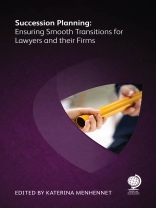It has never been more important for law firms to plan for the future. A highly competitive market, an aging profession, the changing ambitions of younger generations, many of whom place greater importance on work-life balance than reaching top leadership levels, and a long-held reluctance to discuss retirement and succession, all combine to create what some are calling a succession crisis. It is time to face the issue head-on and start putting systems in place to ensure the long-term success and health of lawyers and their firms: succession planning is the answer to this.
A successful succession encompasses two core elements: transitioning firm management to a new generation, and transferring client relationships. This title provides guidance not only on how these two transitions can be achieved effectively, from the perspectives of both individual partners and the firm, but also on the plethora of issues involved in preparing for the departure of retiring partners and transitioning in new leadership, including compensation, the role of diversity and inclusion and financial considerations. It also considers situations where more specific and specialised plans may be required, such as managing the succession of a rainmaker or a founding partner.
A strong and effective succession plan ensures that clients are retained over the long-term, retiring partners leave optimistic and satisfied, future leaders are in place and prepared for their roles, and the firm continues to grow and flourish. The shift to a more remote work environment has also made the institutionalising of processes such as succession planning even more important. By providing a thorough understanding of its many elements, this title explains how effective succession planning can be implemented and ensure smooth leadership and client transitions, securing and enhancing the current and future success of partners and their firms.
Inhaltsverzeichnis
Executive summary vii
About the authors xi
Chapter 1: Creating and implementing a law firm succession plan 1
By Sandra J Boyer, president, Legus International
What is a succession plan? 1
The importance of a succession plan 1
Elements of firm management transition 2
Elements of transitioning firm clients 6
Impediments 7
Additional considerations 8
Conclusion 10
Chapter 2: Succession planning considerations for the senior lawyer . . 11
By Hermann Knott, partner, KUNZ Lawyers
Introduction 11
Types of succession 12
The importance of timing 12
Impact of the size of the firm 14
Preparing the next leaders 15
Conclusion and outlook 15
Chapter 3: Holding on to clients when senior partners retire 17
By Susan Saltonstall Duncan, president, Rain Making Oasis
Introduction 17
Establish a uniform policy for retirement and succession 18
Identify clients potentially at risk and assess relationship breadth and depth 18
Gain better knowledge of clients 19
Talk to each client to gauge client satisfaction, loyalty, and any concerns 20
Carefully select client relationship successors 20
Put a client development and transition plan and process in place 22
Monitor progress to make sure the transition plan is working effectively 24
Client transition checklist 24
Chapter 4: Succession of rainmakers 27
By Jaap Bosman, founder, TGO Consulting
Law firm royalty 27
Real rainmakers and fake rainmakers 28
Hostages and Stockholm Syndrome 29
Santa’s little helpers 31
Retirement reluctance 32
Mitigations 33
Rainmaker succession, hands-on 34
Chapter 5: How to compensate retiring and retired equity partners 37
By August J Aquila, CEO, AQUILA Global Advisors, LLC
Getting started 37
Key partnership agreement issues 38
Retiring partners 38
Creating options for retired partners 42
The successor partner 45
Make it happen 45
Chapter 6: Diversity considerations in succession planning: future-proofing law firms through diversity 47
By Pam Loch, managing director, Loch Associates Group
Introduction 47
Issues facing businesses around lack of diversity 48
How can businesses address these issues? 49
Benefits to business and future-proofing in an increasingly diversity-led culture 52
Conclusion 53
Chapter 7: Financial aspects of succession planning: protection and retirement considerations 55
By Veronica Mann, chartered financial planner, Talis Financial Advisers
Introduction 55
Communication and contracts 56
Financial planning for retirement 56
Death and incapacity of key players 59
Future liabilities 61
To summarize 61
Chapter 8: Succession planning for sole practitioners 63
By Shelley Dunstone, principal, Legal Circles
Thinking of retiring? 63
Will someone want to buy your practice? 63
Options for selling your practice 64
What assets can you sell? 64
What is goodwill, and what is it worth? 65
Options available to a seller 67
How to maximize your prospects of selling your practice 69
Conclusion 70
Chapter 9: Why lawyers and law firms find it difficult to deal with retirement and succession: overcoming the obstacles 71
By Ronnie Fox, partner, Fox & Partners
Five reasons 72
Five ideas 73
Five solutions 75
About Globe Law and Business 79












